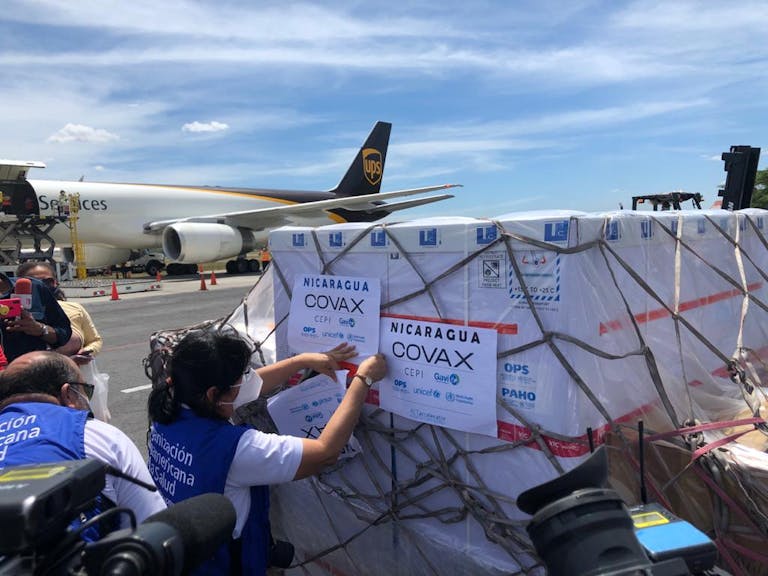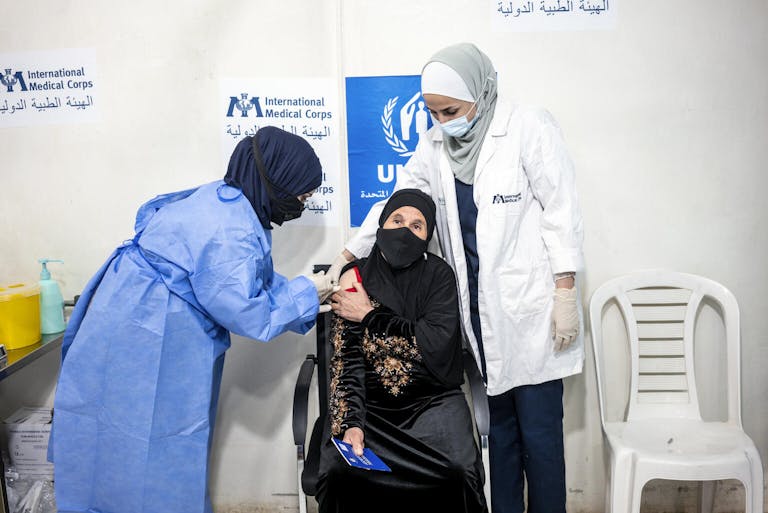Equitable access to COVID-19 tests, treatments, and vaccines makes public health sense, economic sense, and moral sense. But if vaccine distribution remains as grossly inequitable as it is today, there will be no end of this pandemic for anyone. The only solution is to act together through collective solutions such as the Access to COVID-19 Tools Accelerator — a World Health Organization-led global health partnership that aims to equitably get COVID-19 tools to everyone, everywhere. The world must commit and swiftly act to ensure the pandemic will end for rich and poor countries alike.
It’s a marvel that only a year into the COVID-19 pandemic, we have multiple safe and effective vaccines. What’s more, over 1.2 billion doses have already been made available to more than 206 countries. Yet, it’s an injustice that only 0.3% of the world’s supply of COVID-19 vaccines has gone to the world’s poorest countries. As the world watches COVID-19 cases and deaths skyrocket and health systems on the verge of collapse in India, Brazil, and elsewhere, the time to speed an end to the pandemic for everyone, everywhere has never been more urgent.
The ongoing effort to ensure equitable access and distribution to COVID-19 vaccines, tests, and treatments has been led by the Access to COVID-19 Tools (ACT) Accelerator, a first-of-its-kind global partnership led by the World Health Organization (WHO). Since its launch in April 2020, the ACT Accelerator has had a significant impact, thanks to the support of global donors, activists, and unprecedented global cooperation. COVAX, the vaccine pillar of the ACT Accelerator, has delivered more than 49 million vaccines to 121 countries, with the goal of reaching at least 2 billion by the end of 2021. The ACT Accelerator’s diagnostics pillar has procured more than 65 million COVID-19 tests for low- and middle-income countries (LMICs), with ambitions to reach 900 million by year’s end. On treatments, the ACT Accelerator has successfully made 2.9 million doses of dexamethasone available to LMICs, in addition to exploring solutions for oxygen supply for the more than half a million COVID-19 patients in LMICs who need oxygen treatment per day.
Countries — including the U.S. — are stepping up and increasing commitments
During the G7 summit in February, leaders strengthened their commitments to collective solutions to end the pandemic. G7 leaders increased their pledges to the ACT Accelerator to a total of $7.5 billion, building on significant donor contributions earlier from the European Union (EU) and the UK. Especially encouraging was the new commitment of the U.S. government to join the ACT Accelerator with a pledge of $4 billion over the next two years. The U.S. in April also hosted the launch of the GAVI COVAX Advanced Market Commitment Investment Case, which outlined the urgent need for an additional $2 billion by June to try to raise vaccine coverage from 20% of the world’s population to 30% by the end of the year by providing an additional 1.8 billion doses of COVID-19 vaccines for 92 lower-income countries. Given the urgency, governments and private sector partners pledged nearly $400 million to COVAX during the event to increase vaccine supply for the most vulnerable populations in lower-income economies.
More Must Be Done
While the global support for equity has been encouraging with over $14.1 billion committed to date, more investments and commitments from governments and private sector donors will be needed if we are going to even begin to get the pandemic under control. Major funding gaps remain, including an estimated $19 billion to deliver on the ambitious goals of the ACT Accelerator for 2021. While this price tag may seem large, it is less than 1% of the stimulus packages many high-income countries have already adopted. Ultimately, it’s a smart investment so all economies can open up. The reality of a global pandemic is that no one is safe until everyone is safe.

Over the next few months, there will be multiple opportunities for the world to step up its commitments to equitable access to tools that can stop the spread of COVID-19. In May, Italy will host the G20 Global Health Summit, during which additional commitments to the ACT Accelerator are expected. This will be followed in June by the GAVI COVAX Advanced Market Commitment Summit, hosted by Prime Minister Yoshihide Suga of Japan to try to fill funding gaps specifically for equitable vaccine access.
Ongoing efforts are directed at trying to raise funds from both individuals and corporations to support the ACT Accelerator. The UN Foundation is proud to host the ACT Together Fund, as a way for corporations, foundations, and high net worth individuals to donate to the ACT Accelerator. Additionally, we are supporting the WHO Foundation’s Go Give One campaign as its U.S.-based partner. Anyone can give directly online or by starting a Facebook fundraiser to support the cause.
But more than financial commitments must be done. Excess dose sharing via the COVAX Facility must be prioritized by countries that have the luxury of widespread vaccine access. While recent dose sharing promises by the U.S., France, and others is a start, action has been much too slow to make an impact and protect the most vulnerable — front-line workers and older populations — in LMICs. 15 countries have yet to start any vaccination rollout, an unacceptable disparity as the U.S. and other high-income economies expand mass vaccination eligibility.

Increasing desperately needed manufacturing capacity must also be a focus of future steps. With a dwindling global supply of vaccines that cannot keep up with global demand, export restrictions from some countries, and recent disruptions to supply from major COVAX vaccine manufacturer, Serum Institute of India amid India’s skyrocketing cases, the global vaccine supply chain is very precarious. WHO is working with the United Nations Children’s Fund (UNICEF) and a diverse network of governments and private donors to try to scale up production and increase supplies through local production. WHO Director-General Dr. Tedros Adhanom Ghebreyesus, the head of the World Trade Organization, Dr. Ngozi Okonjo-Iweala, and other leaders have been clear that easing patents and sharing technology with manufacturers in LMICs would hugely help to produce more vaccines, as well as tests and treatments.
A race against variants and increasing cases
Mutations in the COVID-19 virus have deepened concerns over the ability to stop transmission with our hard-won vaccines, tests, and treatments. As case counts continue to rise, the risk mounts daily that a variant could emerge that will not respond to the tools we have developed. Already, three major variants of concern have been identified in more than 132 countries. While so far they seem to be responsive to tests and treatments, this situation is fragile. The more the virus continues to circulate, the more likely mutations can emerge. That makes it even more urgent to expand vaccine coverage to priority populations of low- to middle-income countries as rapidly as possible.
UN Foundation Global Health Fellow Logan Nesson contributed to this post.
Feature Photo: Olivia Acland/ UNICEF



 View All Blog Posts
View All Blog Posts


